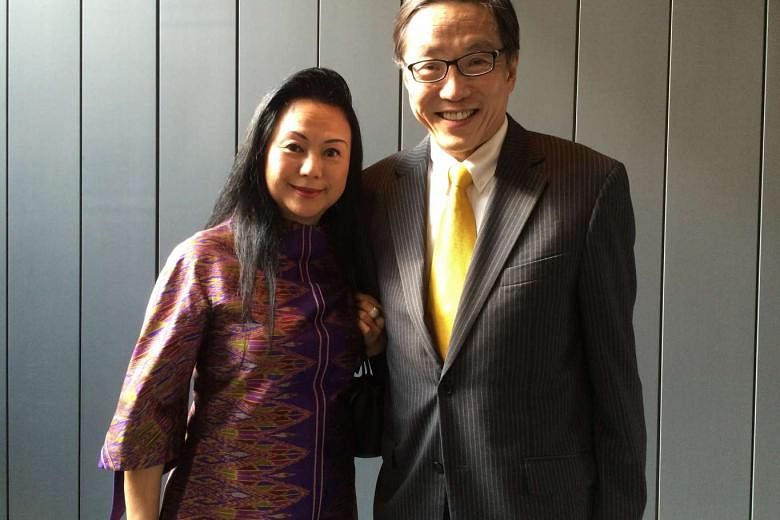Singapore's Banyan Tree brand of resorts is expanding its canopy.
But as the company - known for discreet luxury, romance and environmental sustainability - does so, it also has had to grapple with less than idyllic scenes: trampled corals and guests urinating into the pristine waters.
Singapore's most successful hotel entrepreneur Ho Kwon Ping, executive chairman of public-listed Banyan Tree Holdings, was refreshingly candid about the challenges from an exploding Chinese tourism market, even as his company embraces the opportunities it presents.
"You know, the outbound Chinese tourism is such a big juggernaut - people cannot do without it - and yet it is a problem when they deal with it," he mused.
The so-called boorish Chinese tourist has become almost a caricature in the trade, posing a dilemma especially for high-end establishments that thrive on a certain image and ambience. An owner of a Paris boutique hotel raised eyebrows in 2012 when he said it would not welcome Chinese tourists.
Banyan Tree, Mr Ho made clear, "will not turn people away".
As his wife Claire Chiang, who oversees the company's retail arm, quipped: "Whatever price we fix, the Chinese will come. So that is where we have to do the front-line coaching and hopefully... guide people."
Their belief is that "everyone is educatable".
Mr Ho cited an example. Chinese guests at its Maldives resort - many, from cities such as Chengdu, who had never seen the sea - would "buy rubber-soled shoes".
"And they will wait for the tide to go down, then walk over the corals and break all the corals. And our colleagues were aghast," he said.
But he added, "it's not because they want to destroy the corals. It's because they have no understanding".
So the resort started a new protocol: Each time a Chinese group arrived, a Mandarin-speaking host would welcome them and "in a very polite way... educate them about the coral life".
"And once they understand, they are very compliant," said Mr Ho.
"We can't tell them what to do when they don't behave. But I think through osmosis, they will change."
It is an optimistic undertaking, with ever-fresh waves of newly-rich Chinese among the population of 1.3 billion gaining the means to travel.
But belief in the power of education is part of the DNA of the 63-year-old, who is not just a businessman but is also chairman of the Singapore Management University.
In the past year, as the inaugural S.R. Nathan fellow at the Institute of Policy Studies, he has also delivered a series of prominent lectures on Singapore's policies and politics, with ideas that range from phasing out the Housing Board's role as a developer to having the Government top up CPF funds for retirement.
The couple were in Hong Kong this month when Mr Ho was conferred an honorary Doctor of Business Administration by the Polytechnic University for his contributions to tourism, education and the broader community.
During an hour-long interview, they held forth on issues ranging from Banyan Tree's succession plans to Hong Kong's politics.
While the main interviewee was Mr Ho, it is clear that Ms Chiang, 64, a former Nominated MP, is his feisty equal in family, business and life.
He deflected some questions to her - for instance, when asked about the number of their projects in China which have encountered delays. She was the one with the numbers on hand (the answer: 10 to 12, out of 65 contracts signed).
She contradicted him - "there are still debutante balls!" - when he sought to make the point that Singapore has moved in a more egalitarian direction.
And when probed about chatter that he could be contemplating a run for the presidency, and if that could be on the cards, he laughed and said: "Ask my wife. Should I?"
Her quick reply: "Unless it's a joint presidency! Half term each."
He added: "Good thing, you know, two for the price of one."
More seriously, he said: "There are lots of people for whom it's a very strong act of public service, and who have been in the realm of public service for a long time. You got to run for office, it's a lot of work."
Not that work is alien to Mr Ho. He is busy rolling out a new brand, Dhawa, a more affordable range of hotels targeting the middle class of newly emerging economies, most notably China.
It is part of the company's plans to double its portfolio of 36 hotels in the next five years, two-thirds of which will be in China.
Yet, the Chinese market is one riven by uncertainties, including political ones.
"We have seen some of the projects, which were supposed to open next year, delayed by a year or so," said Mr Ho. "Some, we see the reverse - nine months after signing, they tell you they have to open, because the party secretary who approved the project is moving on!"
The couple - and the company - have an intimate connection with Hong Kong. Mr Ho was born there, and for four years after they married in 1978 they lived in a village on Lamma Island, for which Banyan Tree is named. They visit often, and count among their friends some of the businessmen there.
Asked if he considers himself a tycoon - a loaded term here, often denoting wealthy, flamboyant magnates wielding outsized influence including over the government - Mr Ho, the son of diplomat-industrialist Ho Rih Hwa, joked about his wine cellar, private jet and Paris chateau.
But the discussion soon veered into one about how Singapore, so often compared to Hong Kong, should look to this city and "see what we need to be careful in protecting".
He decried the "worship of money" in Hong Kong, where the tycoons are idolised as "superheroes because they make so much money", and the love for social status - from titles like "Sir" and "Lord" under the British, to deputies to China's National People's Congress.
At a forum last month, the economics-trained former journalist had said that the biggest challenge to Singapore is whether it will slip into irrelevance by becoming a second-tier global city.
This is a concern mirrored in Hong Kong, where some worry that as the rest of China develops, it would become "just another mainland city".
Asked which city he saw more in danger, Mr Ho did not answer directly, but noted that Hong Kong has challenges, including a lack of cohesion and sense of self-destiny - "who we are as Hong Kong".
Meanwhile, its economy is dominated by a "self-serving property market".
"When we talk about the Pearl River Delta, cities like Zhuhai, Shanghai, what is Hong Kong's relative advantage?"
Correction: An earlier version of the report misquoted Mr Ho Kwon Ping when he talked about the "Donald Trump types". The correct quote should be, "I am sure Donald Trump would not be regarded as a hero in Singapore". We are sorry for the error.



